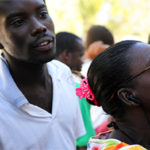Social protection is commonly understood as ‘all public and private initiatives that provide income or consumption transfers to the poor, protect the vulnerable against livelihood risks and enhance the social status and rights of the marginalised; with the overall objective of reducing the economic and social vulnerability of poor, vulnerable and marginalised groups’ (Devereux ...» more
Topic Guides
Our Topic Guides aim to provide a clear, concise and objective report on findings from rigorous research on critical areas of development policy. They highlight the key debates and evidence on the topic of focus, including on approaches and lessons. They are produced in close collaboration with international experts and with practitioners in DFID.
Conflict analysis
Conflict analysis is a structured process of analysis to understand conflict. It focuses on the conflict profile (its history), the actors involved and their perspectives, the causes of conflict, and the dynamics of how these elements interact. This Topic Guide looks at how conflict analysis is done – at the systematic approaches and tools for conflict analysis developed for ...» more
Countering violent extremism
This Topic Guide introduces conceptual and practical approaches to violent extremism in different contexts, setting out what we know from the literature (English and Arabic). ...» more
National climate change governance
Without the rapid implementation of pro-poor, climate-informed development policies, climate change impacts could result in 100 million more people in extreme poverty by 2030. Development policies need to consider climate risk scenarios while expanding ‘no-regrets’ social protection programmes that provide benefits to vulnerable populations under different climate ...» more
Urban governance
What is urban governance and why does it matter? How can key urban policy issues be addressed? This topic guide introduces the literature on urban governance and its relationship to growth and poverty reduction. It considers the key debates and issues, and sets out some implications for practice on specific urban governance challenges. ...» more
Open data, transparency and accountability
Open data involves the release of data so that anyone can access, use and share it. One of the main objectives of making data open is to promote transparency. For open data and transparency initiatives to lead to accountability, the required conditions include: getting the right data published; enabling actors to find, process and use information, and to act on any outputs; ...» more
Social movements
Social movements express social, cultural, political or economic concerns locally, nationally or transnationally, and they are found in both democratic and repressive states. A variety of actors use social movements to champion a cause and direct, promote or resist change. This topic guide introduces some of the key literature and debates on social movements and collective ...» more
Organised crime, violence and development
Organised crime ranges from protection economies and extortion rackets to cybercrime, oil theft, money laundering, counterfeiting, maritime piracy and the trafficking and/or smuggling of people, firearms, illicit drugs, and wildlife. It is sometimes associated with violence, but there is no strong correlation between them. Conventional law enforcement and security approaches to ...» more
Transitional justice
It is increasingly recognised that legacies of mass violence and human rights violations can, if left unaddressed, fuel future conflicts. Transitional justice seeks to tackle the legacies of large-scale past abuses, and includes mechanisms such as truth-telling initiatives, criminal prosecutions, reparations processes, cultural interventions, vetting and institutional ...» more
Safety, security and justice
Safety, security and justice are priorities for poor people and are associated with development outcomes. What do we know about what has – or hasn't – worked in safety, security and justice programming, and where? This updated Topic Guide for policymakers and practitioners synthesises the evidence, challenges and approaches that emerge from the literature. ...» more
Climate change and social development
This topic guide synthesises literature on the links between climate change and social development, and includes evidence of their interactions, lessons, approaches and tools. It considers climate change impacts and climate-relevant interventions in the following areas: five sectors: agriculture and food security, health, water, energy, and low-carbon transport; three ...» more
Poverty and inequality
This topic guide introduces key readings and debates on poverty and inequality. It covers measurement and analysis, trends and projections, and understanding and addressing extreme poverty and inequality. ...» more
State-society relations and citizenship
State-society relations, citizenship and socio-political cohesion are areas of great importance to statebuilding and peacebuilding and are crucial to an integrated approach. State-society relations are defined by DFID as ‘interactions between state institutions and societal groups to negotiate how public authority is exercised and how it can be influenced by people. They are ...» more
Fragile states
This Topic Guide introduces some of the best literature on state fragility and the challenge of aid effectiveness and lessons learned from international engagement in these contexts. It highlights the major debates in the international development and academic community on understanding and responding to fragile situations. It is intended primarily as a reference guide for ...» more
Disability inclusion
This topic guide summarises some of the most rigorous available evidence on the key debates and challenges of disability inclusion in development and humanitarian response. Disability does not necessary imply limited wellbeing and poverty. Yet there is growing evidence that the estimated one billion people with disabilities face attitudinal, physical and institutional ...» more
Social development and human development
This Topic Guide aims to answer the question ‘What is the interaction between social development issues and human development outcomes?’ An individual’s right to lead a long and healthy life, to be educated and to enjoy a decent standard of living cannot be realised without addressing social development issues. This is because these issues determine individuals’ access to ...» more
State-business relations
State-business relations in low income countries are seen as a key determinant of inclusive growth and of structural transformation – shifts in economic structure to more productive activities and sectors. Effective state-business relations can boost economic growth by increasing the rate and the productivity of investment. State-business relations can take the form of ...» more
Economic development in fragile and conflict-affected states
This Topic Guide draws on lessons from programmes and case studies to explore which types of economic development interventions can be effective in FCAS and which factors have contributed to successes and failures. ...» more
The social impact of private sector development
The private sector can have a transformational impact on peoples’ lives as a creator of jobs and producer of goods and services that poor people use. Donor agencies are paying increasing attention to how private sector development can be leveraged to support poverty reduction and sustainable, equitable and inclusive economic growth. Making use of social development thinking is ...» more
Social exclusion
This publication aims to introduce some of the best literature on the definitions, understandings, causes, and impact of social exclusion, as well as how exclusion can be measured and addressed by governments, civil society actors and international organisations. The guide was written by Seema Khan (GSDRC), in close collaboration with Professor Frances Stewart (Centre for ...» more




















